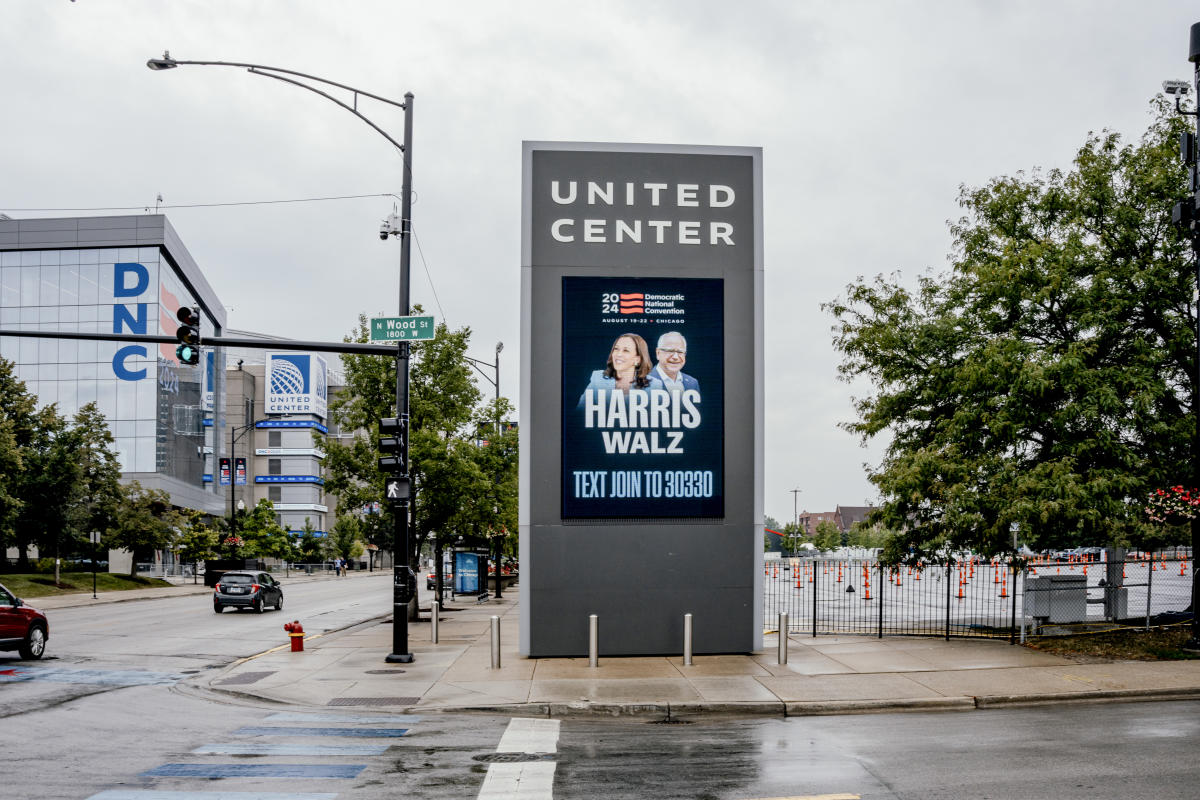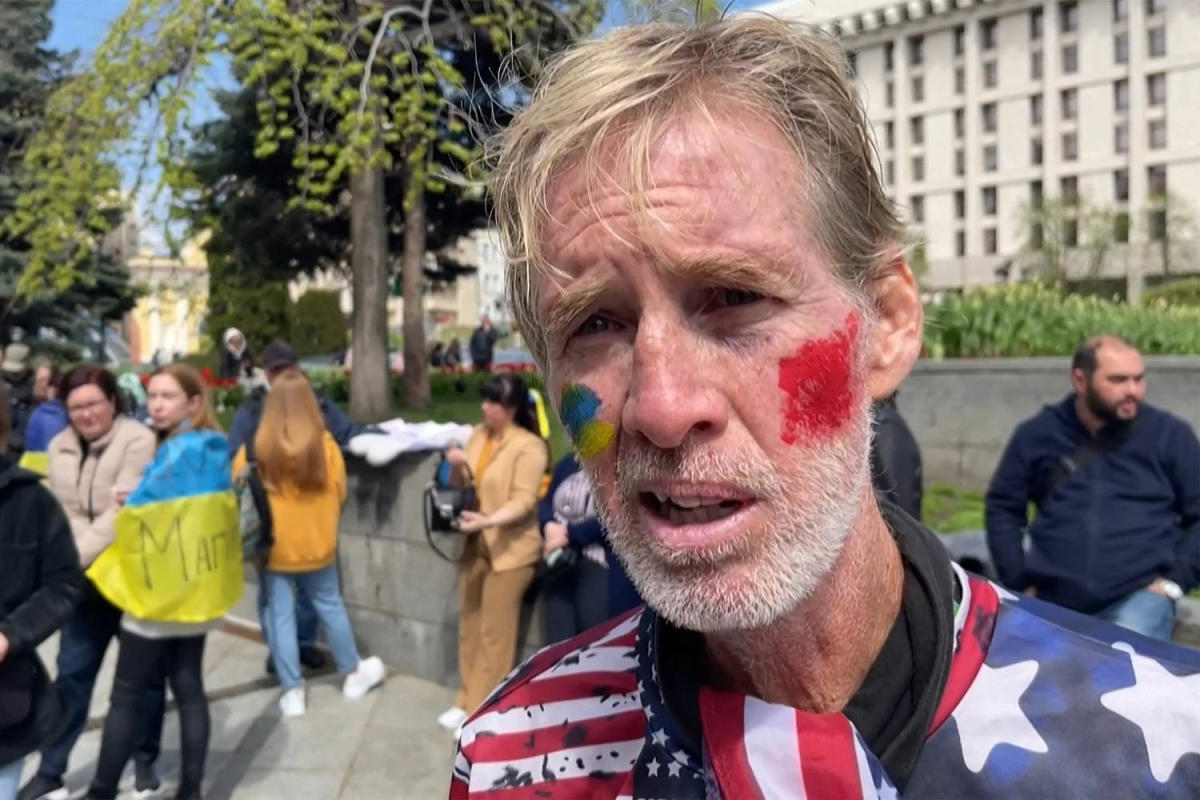CHICAGO — Even as feel-good displays of joy and confidence are set to dominate the Democratic National Convention this week in Chicago, one painful issue is bitterly dividing the Democratic establishment from its left flank: the Israel-Hamas war in the Gaza Strip.
The specter of convention-upending protests that hovered over a gathering hosted for President Joe Biden has receded somewhat with the rise of a new candidate in Kamala Harris, who is seen as more sympathetic to Palestinian rights activists. But tens of thousands of protesters are still expected to convene just outside the event’s security perimeter, and the potential for high-profile disruptions remains real.
Emphasizing the unity theme, convention planners have tried to mollify both Muslim and Jewish Americans.
Sign up for The Morning newsletter from the New York Times
Speaking slots have been allotted to the families of American hostages held by Hamas in Gaza. One of the most prominent Muslims in national politics, Keith Ellison, the progressive attorney general of Minnesota, will be given time onstage. Doug Emhoff, the husband of Harris, is expected to speak proudly of his Judaism. And the Democratic platform highlights America’s commitment to Israeli security.
At the same time, Harris’ campaign manager, Julie Chavez-Rodriguez, held a series of meetings last week to hear the concerns of Arab Americans and some delegates representing Democratic primary voters who cast “uncommitted” ballots in the Democratic primary to protest Biden’s Israel policy.
Despite such efforts, the convention will be shadowed by large protests against the Biden-Harris administration’s approach to a war that Gaza health authorities say has killed more than 40,000 Palestinians since the Hamas attack on Oct. 7 that left 1,200 people dead in Israel.
The key question for Democrats this week is whether the demonstrators represent a meaningful group of voters who could swing the election in November, or if they are outliers on the left who should be resisted in an appeal to the center.
Either way, the subject of the war is bound to be a central issue throughout the convention, said Gov. Phil Murphy of New Jersey.
“It is a reality, and it cannot be ignored,” he said. “There’s too much tragedy, there’s too much loss of innocent life, and by the way, there’s still too much — at a very high level — of geopolitical risk, and that is not going away, unfortunately, anytime soon.”
Protests of the war, led by Arab Americans, Muslim Americans and young progressives, roiled campuses and cities across the country this spring and dogged campaign appearances by Biden. Demonstrators have also made their presence known, though at a smaller scale, at some of Harris’ appearances since she became the de facto nominee.
Jewish voters and some political moderates, for their part, have been asking for a stronger sign from Harris that she will stand by the U.S.-Israel alliance, and stare down the political left.
“There’s just something about Kamala Harris that just gives me serious anxiety,” said Ezra Katz, 76, a real estate developer and political independent in South Florida whose skeptical missives to an expansive email list reach thousands of American Jews. To Katz, Harris has tried to be all things to both sides of the Israeli-Palestinian divide.
“Sooner or later you’re going to have to take a position, and sooner or later you’re going to have to be sure of what you mean,” he said of Harris’ stance on Israel.
The political consequences of Harris’ efforts to assuage both constituencies are far less clear. Next to inflation, housing costs and abortion, the Israel-Hamas war is not as much of a driver for most Democratic voters, even young voters. New polling data to be released Monday by the University of Chicago and GenForward found mixed feelings from voters younger than 40: Thirty-six percent of them disapproved of military aid to Israel, while 33% approved and 29% had no opinion.
More important, the poll showed that the Israel-Hamas war ranked near the bottom of young voters’ concerns, well below immigration, economic growth and income inequality.
The Harris campaign, new as it is, has tried to find some semblance of unity among Democrats on the issue. On Thursday, Chavez-Rodriguez flew to Detroit to meet privately with Abbas Alawieh, a Michigan delegate to the convention representing “uncommitted” primary voters. She also met with Arab American and Jewish leaders.
Senior officials from the Democratic National Committee held meetings Thursday with other “uncommitted” delegates in Chicago, and are planning to hold daytime panel discussions during the convention with Palestinian Americans, including “uncommitted” delegates, and with Jewish Americans.
Nonetheless, there are signs of strife for the week ahead. Delegates to the convention representing “uncommitted” voters plan to hold news conferences each morning in the Fulton Market district, a short walk from the United Center, where prime-time convention speeches will be held. Inside the arena, these delegates plan to hold a vigil for those killed since Oct. 7, Israeli and Palestinian alike. Pins distributed to “uncommitted” delegates and some Harris supporters will identify “cease-fire delegates,” organizers of the uncommitted movement said.
Large-scale protests are planned at the Israeli consulate in downtown Chicago and in the streets and parks near the convention Tuesday, Wednesday and Thursday.
In the meantime, pro-Israel groups like Democratic Majority for Israel, the Jewish Democratic Council of America and the liberal pro-Israel organization J Street will hold events to try to respond to their voters’ concerns.
Some Jewish Democrats say it is imperative for Harris and her running mate, Gov. Tim Walz of Minnesota, to show voters that they will not be cowed by their left flank, and that the U.S. commitment to Israel’s security is inviolable. Much has been made about a brief meeting on a photo line that Harris had with Alawieh and Layla Elabed, a Palestinian American in Michigan, who are both founders of a protest group, the Uncommitted National Movement.
When Elabed suggested that Harris was open to the group’s demand for an immediate arms embargo on Israel, the vice president’s national security adviser, Phil Gordon, rushed to say she was not.
Some Jewish Democrats say they need reassurance from the standard-bearer herself.
“With hostages still in captivity and Iran and Hezbollah threatening more war, the pro-Israel community needs some reassurance,” Mark Mellman, the president of Democratic Majority for Israel. “Vice President Harris has an exceptional record, but she doesn’t have the 50-year relationship with the community that President Biden has.”
But he added that the convention should not need to spend much time on the conflict. The Israel-Hamas war might be foremost on protesters’ minds, he said, but not the minds of most voters.
The concern among pro-Israel groups is that Palestinian rights protesters cannot be mollified. Israel supporters note that demands like an arms embargo are highly unlikely to be met, and say that by tiptoeing coyly around such groups, Harris risks alienating the pro-Israel community without actually winning over skeptical Arab American and Muslim voters.
But pro-Palestinian voters do hold one significant point of leverage: They are concentrated in Michigan, a critical battleground state. The state’s Democratic Party, led by its chair, Lavora Barnes, has been working for more than a year to ease the concerns of Michigan’s large Arab American and Muslim populations, hiring three people last month to ramp up the effort.
A separate effort is being led by the Harris-Walz campaign, said Abed Ayoub, the national executive director of the American-Arab Anti-Discrimination Committee and a Palestinian rights activist in Michigan.
Palestinian rights organizers say that the requests of “uncommitted” delegates for prime-time speaking spots at the convention have been rebuffed, as have their demands for credentials to bring activists into the United Center.
The protest group Abandon Biden plans to hold a news conference Monday in Chicago with two outsider candidates for president, Jill Stein of the Green Party and independent Cornel West, to announce its plans for the fall, said Hudhayfah Ahmad, a spokesperson for the group.
But, he said, he is not holding out much hope for conciliatory gestures from Democrats.
“I think they figure they can win without us,” he said, “so now they’re ignoring us.”
c.2024 The New York Times Company

Amanda Smith is a dedicated U.S. correspondent with a passion for uncovering the stories that shape the nation. With a background in political science, she provides in-depth analysis and insightful commentary on domestic affairs, ensuring readers are well-informed about the latest developments across the United States.






